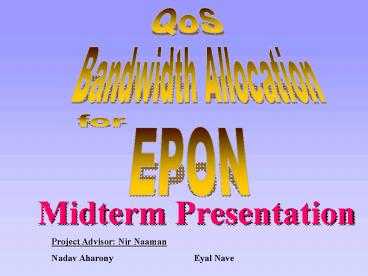QoS - PowerPoint PPT Presentation
1 / 19
Title:
QoS
Description:
... for a 1Gb Link: ~ 32 64 ONUs. EPON = Ethernet over PON ... Collect reports from all ONUs. Ability to generate GATE messages. Basic statistics gathering ... – PowerPoint PPT presentation
Number of Views:187
Avg rating:3.0/5.0
Title: QoS
1
QoS
Bandwidth Allocation
for
EPON
Midterm Presentation
Project Advisor Nir Naaman Nadav Aharony
Eyal Nave
2
Presentation Overview
- Background - 802.3ah EPON
- Project Description
- Project status and advancement plan
3
Project Background
4
IEEE 802.3ah
IEEE 802.3 Ethernet 802.3ah
Ethernet in the First Mile (EFM) Task Force
Current stage nearing task force draft Expected
Standard Approval 3rd quarter 2003
Scope Ethernet Over Copper (P2P) Ethernet Over
Fiber - (P2P P2MP)
Current initiative defines the fiber access rate
at 1Gbps Future expansions to 10Gbps
5
PON Access Network
PON Passive Optical Network
EPON Ethernet over PON
Central Office (CO) OLT Optical Line
Terminal Customer Premise (CP) ONU Optical
Network Unit
Preliminary Approximation for a 1Gb Link 32
64 ONUs
6
Downstream Model
Data in true Ethernet frames
7
Upstream Model
- TDMA
- No collisions
- No fragmentation
8
The Project
9
Project Goal
Design and test bandwidth allocation
algorithms for the EPON upstream
- Design and analyze several bandwidth allocation
algorithms - Create EPON simulation in OPNET
10
Project Stages
Scheduling Algorithms
OPNET Simulation
Project Definition
Proposals and Fine-tuning
Prototype
Basic Scenario (Phase 1)
Analysis
Comparison
Algorithm Simulation
Conclusion
11
Test Scenario
Grant Allocation Messages
Downstream Bus
Upstream Bus
TDMA ONU Traffic Status Reports
12
OPNET Prototype
Goal Construct a basic OPNET model of EPON
- Main Features
- Add 802.3ah packet formats (new MAC messages)
- TDMA bandwidth allocation scheme
- ONU
- Filter GATE messages and act upon them
- Generate REPORT messages based on queue status
- OLT
- Collect reports from all ONUs
- Ability to generate GATE messages
- Basic statistics gathering
13
ONU Data Path
To PON
REPORT Msgs
From PON
MAC Control Msgs
1 Gbps
ONU Traffic
ONU Data
14
ONU Scheduler
Future control msgs
Schedule Grant Interrupts
End Transmition Actions
Start Transmition Actions
Generate Status Report
15
OLT Data Path
To PON
GATE Msgs
From PON
MAC Control Msgs
1 Gbps
Upstream Data
16
OLT Scheduler
Collect and handle reports
Future control msgs
Compose GATE messages based on Grant Table and
send to Network
Insert Algorithm Here!
17
New MAC Messages
REPORT
GATE
- GATE
- Start Time
- Length
- Generate Report?
REPORT Status of 8 Priority Queues
18
Project Status
Scheduling Algorithms
OPNET Simulation
Project Definition
Proposals and Fine-tuning
Prototype
Semester 1
Basic Scenario (Phase 1)
Semester 2
Analysis
Comparison
Algorithm Simulation
Conclusion
19
- The Presentation Ends
- The Work Continues
20
From here on the slides are to be hidden
21
Why EPON?
- The combination of Ethernet and PON many
benefits - Future-Proof Can adapt to all foreseeable
access applications - Ethernet is widely spread and implemented
- Will enable a single end-to-end protocol
- Scaleable and even dynamic bandwidth for each
subscriber - Single approach for different architectures
- Passive fibers offers lower maintenance and
expences, and easy line-rate upgrades
22
Traffic
- EPON is ultimately intended to converge all of
the subscribers communication traffic - Plain old telephony system (POTS)
- Voice and video digital telephony
- Data IP traffic
- Legacy TDM traffic (E1,T1 etc.)
- Television broadcasts/Video on demand
- Any other foreseeable service type
23
Scheduling Principles
- Global clock in OLT
- PHY-ID entities enable grant flexibility
- GATE message defines start-stop times for each
transmission - Laser power-on/off delay
- ONU\OLT scheduler not defined by standard.
The Standard allows great freedom in
implementation
24
MPCP
MPCP Multi Point Control Protocol
- Adds new MAC Control messages.
- Functions performed
- Controlled network boot process
- (REGISTER_REQ,REGISTER, REGISTER_ACK)
- Bandwidth assignment to end-stations
- (GATE)
- Bandwidth polling from end-stations
- (REPORT)
25
The Problem
The project concentrates on the bandwidth
allocation problem of the upstream link from the
OLTs point of view in a scenario with multiple
ONUs, a single subscriber per ONU, each employing
multiple traffic types (CBR and BE at the least),
each with its own QoS parameters .
26
Our Mission
- Propose and analyze several bandwidth allocation
algorithms. - Construct an EPON simulation in OPNET, matching
802.3ah, and enabling insertion of different
scheduling algorithms. - Build an appropriate OPNET scenario.
- Simulate proposed algorithms.































